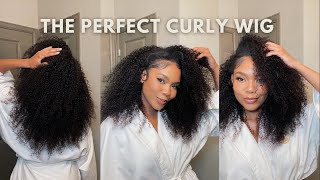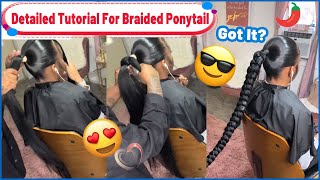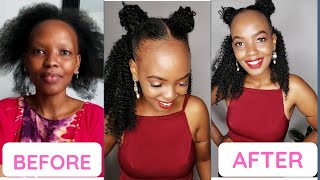Are You In The Business Of Growing Your Hair Long Or In Defending Natural Hair At All Costs? Part 1
 Once you come to the conclusion that majority of the items on your new years resolution list will be left in the ‘to do’ pile all year, permit me to open your eyes to the truth about natural hair.
Once you come to the conclusion that majority of the items on your new years resolution list will be left in the ‘to do’ pile all year, permit me to open your eyes to the truth about natural hair.
I’ve often wondered if we enjoy being in denial. We staunchly defend positions that don’t give us long term positive results while holding out hope that our beliefs will come good someday. Remaining natural in spite of clear evidence that it does not suit your style of living is one of those things.
Now, I’m not dismissing natural hair as genuinely the best method there is to growing black hair long (I’ve been natural for 3.5 years now by choice) but I will certainly not defend it at all costs when I can clearly see that it doesn’t work for all of us.
Let me paint you a picture. We have 27 year old Mona who knows all about good hair care, has visited the hair boards on occasion and is inpired by all the stories and images of flowing locks. It was then that she chopped off her arm pit length relaxed hair and has been natural now for 4 years. She washes her hair weekly, she is a single mum of 3 and in college 5 days a week so during the week she cannot devote any time to her hair.
At the weekend, if she is not studying the library, she is making the rounds to various relatives’ houses. There is always someone getting married, being christened, someone’s birthday or just a plain ol get together. She prefers to keep her hair out of the way in braids or full weaves* so she only has her real hair out for about 4 months in the year. When her hair is worn out, it is usually in a braid out, she avoids heat at all costs.
You would imagine that with all this protective styling, she would have at the very least BSL (bra strap length) hair now. Nope. Her hair is just an inch below shoulder length, actually a bit shorter than when she was relaxed! Mona loves her natural 4b hair, it has more volume than her relaxed hair ever did but for her, being natural hasn’t delivered on it’s promise of long locks. She is ready to relax her hair again but is worried about breakage. What should she do?
To answer this question, it is importatnt to look at the evolutionary record of why afro hair exists when across humanity and in fact the animal kingdom in general, straight hair is dominant (even apes have straight hair!). Here’s what the evolutionary record has on Afro hair and further to the comments below, I would like recommend The Descent of Man by Charles Darwin and Skin A Natural History by Nina Jablonski for further ideas as to why skin hair and other traits in man have been selected in our evolutionary past.
Afro-textured hair may have initially evolved because of an adaptive need (amongst humanity’s hominid ancestors) for protection against the intense UV radiation of Africa. Subsequently (and/or additionally), because the relatively sparse density of Afro-hair, combined with its springy coils, results in an airy, almost sponge-like effect, the resulting increased circulation of cool air onto the scalp may have served to facilitate our hominid ancestors’ body-temperature-regulation while they lived in the open savannah. Further, Afro-hair does not respond as easily to moisture/sweat as straight hair. Thus, instead of sticking to the neck and scalp when wet (as do straighter textures), unless totally drenched, it tends to retain its basic springy puffiness. In this sense, in addition to the above-listed causes, the trait may have also been retained/preferred among many equatorial human groups because of its contribution to enhanced comfort levels under warm conditions. Finally, sexual selection based on visual and/or tactile socio-aesthetics may have also and/or further contributed to this trait’s ubiquity in certain regions.
Historically, afro-textured hairstyles were used to define status, or identity, in regards to age, ethnicity, wealth, social rank, marital status, religion, fertility, manhood, and even death. Hair was carefully groomed by those who understood the aesthetic standard as the social implications of hair grooming was a significant part of tribal life. Dense, thick, clean and neatly groomed hair was something highly admired and sought after. Hair groomers possessed unique styling skills allowing them to create a variety of designs that met the local cultural standards. Hair worn in its loose state was not the norm, and usually left the impression that an individual was filthy, mentally unstable or in mourning.
Pretty self explanatory, afro hair isn’t built for length but rather as a protective, cooling covering for our heads. African tribes have historically grown their hair long by wearing it in braids (Masai & Samburus) or by locking. But what if you want long loose hair? In part 2 I will look into solutions.




